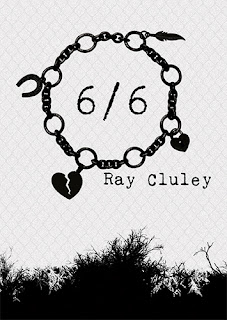The shortlists for the British Fantasy Awards were
announced on Tuesday, and I'm stunned to have made the running for not one, but two awards.
Wolf's Hill has been shortlisted for the August Derleth Award for Best Horror Novel, alongside
Little Eve by Catriona Ward,
The Cabin At The End of The World by Paul Tremblay and
The Way of The Worm by Ramsey Campbell.
To be sharing a shortlist with those three authors, those three novels, to be included in the same category, feels like an award in itself. I'd be happy to lose to any of them.
It's also particularly poignant because the Black Road novels mean a lot to me, and there've been times when I wonder if anyone's even reading them. In guess some people are, and enjoying them too.
Breakwater, meanwhile, has been shortlisted for Best Novella, alongside 'Binti: The Night Masquerade' by Nnedi Okorafor, 'The Land Of Somewhere Safe' by Hal Duncan, 'The Last Temptation Of Dr Valentine' by John Llewellyn Probert, 'The Only Harmless Great Thing' by Brooke Bolander and 'The Tea Master And The Detective' by Aliette de Bodard. Again, a storming list of names.
The winners will be announced at FantasyCon in Glasgow on 20th October.
Here are the BFA nominations in full:
Best Fantasy Novel (the Robert Holdstock Award)
The Bitter Twins, by Jen Williams (Headline)
Empire of Sand, by Tasha Suri (Orbit)
Foundryside, by Robert Jackson Bennett (Jo Fletcher Books)
The Green Man’s Heir, by Juliet E McKenna (Wizard’s Tower Press)
The Loosening Skin, by Aliya Whiteley (Unsung Stories)
Priest of Bones, by Peter McLean (Jo Fletcher Books)
Best Horror Novel (the August Derleth Award)
The Cabin at the End of the World, by Paul Tremblay (Titan Books)
Little Eve, by Catriona Ward (W&N)
The Way of the Worm, by Ramsey Campbell (PS Publishing)
Wolf’s Hill, by Simon Bestwick (Snowbooks)
Best Newcomer (the Sydney J Bounds Award)
Tomi Adeyemi, for The Children of Blood and Bone (Macmillan Children’s Books)
Cameron Johnston, for The Traitor God (Angry Robot)
RF Kuang, for The Poppy War (HarperVoyager)
Tasha Suri, for Empire of Sand (Orbit)
Marian Womack, for Lost Objects (Luna Press Publishing)
Micah Yongo, for Lost Gods (Angry Robot)
Best Novella
Binti: The Night Masquerade, by Nnedi Okorafor (Tor.com)
Breakwater, by Simon Bestwick (Tor Books)
The Land of Somewhere Safe, by Hal Duncan (NewCon Press)
The Last Temptation of Dr Valentine, by John Llewellyn Probert (Black Shuck Books)
The Only Harmless Great Thing, by Brooke Bolander (Tor.com)
The Tea Master and the Detective, by Aliette de Bodard (Subterranean Press)
Best Short Fiction
Down Where Sound Comes Blunt, by GV Anderson (F&SF March/April 2018)
Her Blood the Apples, Her Bones the Trees, by Georgina Bruce (The Silent Garden: A Journal of Esoteric Fabulism)
In the Gallery of Silent Screams, by Carole Johnstone & Chris Kelso (Black Static #65)
A Son of the Sea, by Priya Sharma (All the Fabulous Beasts)
Telling Stories, by Ruth EJ Booth (The Dark #43)
Thumbsucker, by Robert Shearman (New Fears 2)
Best Anthology
The Devil and the Deep: Horror Stories of the Sea, ed. Ellen Datlow (Night Shade Books)
Humanagerie, ed. Sarah Doyle & Allen Ashley (Eibonvale Press)
New Fears 2, ed. Mark Morris (Titan Books)
This Dreaming Isle, ed. Dan Coxon (Unsung Stories)
Year’s Best Weird Fiction, Vol. 5, ed. Robert Shearman & Michael Kelly (Undertow Publications)
Best Collection
All the Fabulous Beasts, by Priya Sharma (Undertow Publications)
The Future is Blue, by Catherynne M Valente (Subterranean Press)
How Long ‘til Black Future Month?, by NK Jemisin (Orbit)
Lost Objects, by Marian Womack (Luna Press Publishing)
Octoberland, by Thana Niveau (PS Publishing)
Resonance & Revolt, by Rosanne Rabinowitz (Eibonvale Press)
Best Non-Fiction
The Evolution of African Fantasy and Science Fiction, ed. Francesca T Barbini (Luna Press Publishing)
The Full Lid, by Alasdair Stuart (alasdairstuart.com/the-full-lid)
Ginger Nuts of Horror (www.gingernutsofhorror.com)
Les Vampires, by Tim Major (PS Publishing)
Noise and Sparks, by Ruth EJ Booth (Shoreline of Infinity)
Best Independent Press
Fox Spirit Books
Luna Press Publishing
NewCon Press
Unsung Stories
Best Magazine / Periodical
Black Static
Gingernuts of Horror
Interzone
Shoreline of Infinity
Uncanny Magazine
Best Audio
Bedtime Stories for the End of the World (endoftheworldpodcast.com)
Blood on Satan’s Claw, by Mark Morris (Bafflegab)
Breaking the Glass Slipper (www.breakingtheglassslipper.com)
PodCastle (podcastle.org)
PsuedoPod (pseudopod.org)
Best Comic / Graphic Novel
100 Demon Dialogues, by Lucy Bellwood (Toonhound Studios)
B.P.R.D. Hell on Earth, Vol. 1, by Mike Mignola, John Arcudi, Guy Davis, Tyler Crook & Dave Stewart (Dark Horse)
Hellboy: The Complete Short Stories, Vol. 1, by Mike Mignola and others (Dark Horse)
The Prisoner, by Robert S Malan & John Cockshaw (Luna Press Publishing)
Saga #49-54, by Brian K Vaughan & Fiona Staples (Image Comics)
Widdershins, Vol. 7, by Kate Ashwin
Best Artist
Vince Haig
David Rix
Daniele Serra
Sophie E Tallis
Best Film / Television Production
Annihilation, Alex Garland
Avengers: Infinity War, Christopher Markus & Stephen McFeely
Black Panther, Ryan Coogler & Joe Robert Cole
The Haunting of Hill House, Mike Flanagan
Inside No. 9, series 4, Steve Pemberton & Reece Shearsmith
Spider-Man: Into the Spider-Verse, Phil Lord & Rodney Rothman
Congratulations to my fellow nominees!





























